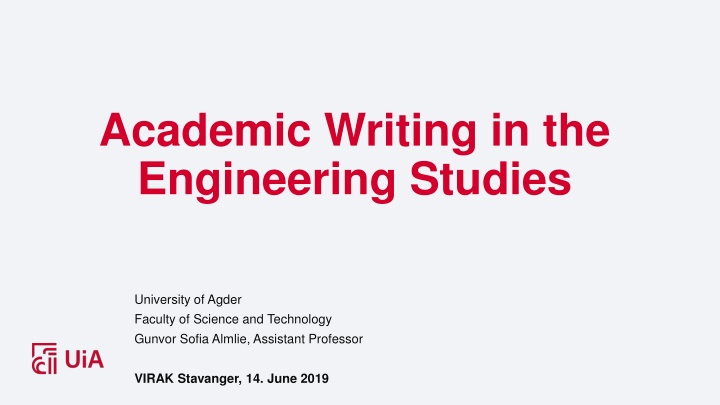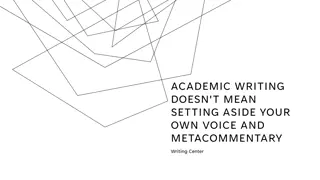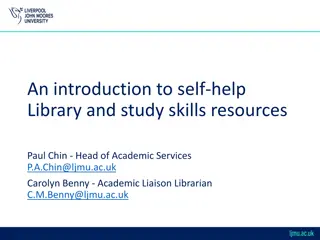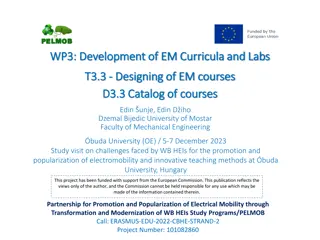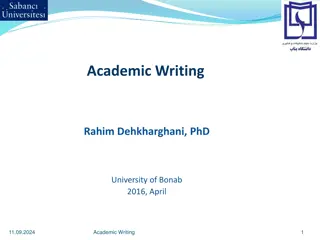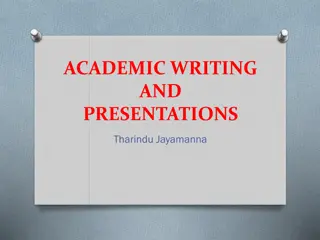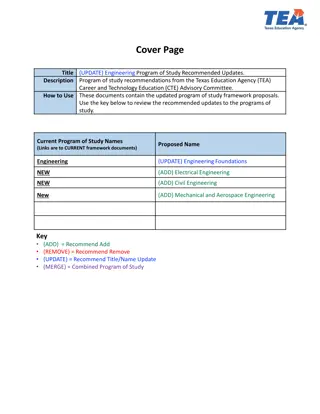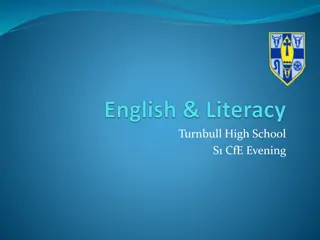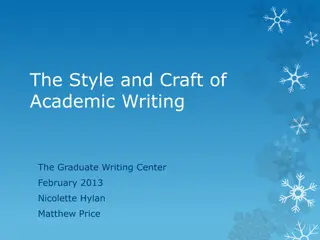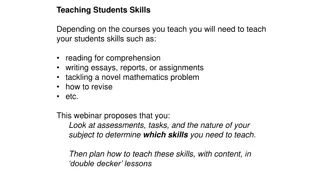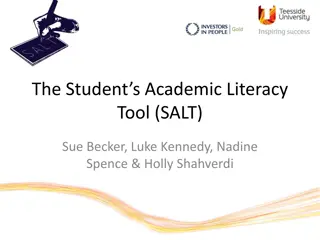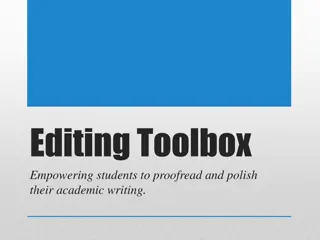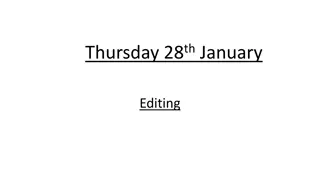Enhancing Academic Writing Skills for Engineering Students: A Case Study
This study by Gunvor Sofia Almlie, Assistant Professor at the University of Agder, addresses the challenges engineering students face in academic writing. The solution proposed involves disciplinary crash courses and evaluation through surveys. Through lectures, supervision, and feedback, the study aims to improve course design and student preparation for academic writing. Survey findings on students' perceptions of lectures, supervision, and challenges are presented, highlighting high satisfaction rates. The methodology involves a survey with items borrowed from Monash University for data collection. The report underscores the importance of effective academic writing support for engineering students.
Download Presentation

Please find below an Image/Link to download the presentation.
The content on the website is provided AS IS for your information and personal use only. It may not be sold, licensed, or shared on other websites without obtaining consent from the author.If you encounter any issues during the download, it is possible that the publisher has removed the file from their server.
You are allowed to download the files provided on this website for personal or commercial use, subject to the condition that they are used lawfully. All files are the property of their respective owners.
The content on the website is provided AS IS for your information and personal use only. It may not be sold, licensed, or shared on other websites without obtaining consent from the author.
E N D
Presentation Transcript
Academic Writing in the Engineering Studies University of Agder Faculty of Science and Technology Gunvor Sofia Almlie, Assistant Professor VIRAK Stavanger, 14. June 2019
Background Problem: Engineering students problems in writing academic texts Solution: Disciplinary crash courses in academic writing Evaluation: A survey Gunvor Sofia Almlie
Objective of the Study Academic writing in the professional studies: How to better prepare students for academic writing Students perception of course design and supervision in academic writing Improving course design accordingly Contributions to the general discourse on academic writing at university level Gunvor Sofia Almlie
Course Description Integrated in Introductory Course for Engineering 5 sp Lectures over three weeks (4 lessons of total 44) Library staff lectured on sources and referencing style (2 lessons) Supervision 2 lessons a week during semester The use of the library s writing shed skrivestua for supervision Discipline- and task-related instruction Gunvor Sofia Almlie
Method Survey Some items borrowed from Monash University (Dawson et al, 2018) Autumn 2018 Distributed online Maximum response rate 41% Minimum response rate 26% Gunvor Sofia Almlie
Overview of Reported Data Data findings are grouped into three categories 1. Students perception of lectures 2. Supervision and feedback 3. Students perceived challenges Gunvor Sofia Almlie
Students Perception of Lectures 78% find lectures in academic writing useful 88% are satisfied with lectures in academic writing Gunvor Sofia Almlie
Supervision and Feedback: Satisfaction 97% are satisfied with supervision and feedback Gunvor Sofia Almlie
Supervision and Feedback The feedback helped achieve learning outcomes for the course 1 0 % 20 % 40 % 60 % 80 % 100 % Strongly disagree Disagree Neither disagree nor agree Agree Strongly agree Not able to judge Gunvor Sofia Almlie
Supervision and Feedback: Who provided you with comments on your assignment? n Before submission After submission Lecturer/disciplinary supervisor 58 23 Library supervisor 17 2 Peers 59 12 Friends 26 5 Gunvor Sofia Almlie
How do students prefer to receive feedback on assignments? 1% Hand written comments on a hard copy document 17% 26% Hand written comments on a scanned document Electronic annotations 21% Face-to-face I do not pay attention to comments 35% Gunvor Sofia Almlie
Comments on supervision and feedback Feedback from supervisor/assessor I will use to comments to improve my work The comments were assignment-related The comments were personalised I understood the comments The comments were detailed Strongly disagree Disagree Neither disagree nor agree Agree Strongly agree Not able to judge 0% 10% 20% 30% 40% 50% 60% 70% 80% 90% 100% Gunvor Sofia Almlie
Summary: The Role of Feedback and Supervision Supervision and feedback help achieve learning outcomes Supervision motivates Electronic and face-to-face feedback preferred Detailed and personalised supervision preferred Gunvor Sofia Almlie
What do students find difficult in academic writing? Gunvor Sofia Almlie
What do students find difficult in academic writing? Not challenging Somewhat challenging Very challenging Item: Please rate the degree of difficulty of the following Finding relevant sources 25% 58% 17% Creating a thesis statement 13% 61% 26% Text structure 42% 45% 13% Writing in English 59% 32% 9% Finding my own voice 48% 40% 12% Correctly referencing sources 32% 48% 21% Cooperating in groups 38% 44% 18%
Summary: Students Challenges in Academic Writing Most challenging: Finding and using sources correctly Creating a research question. Least challenging: Writing in English Structuring text Gunvor Sofia Almlie
Conclusion Students find lectures and feedback useful in order to achieve learning outcomes. Supervision and feedback more useful than lectures Students biggest perceived challenge in academic writing is to create a thesis/research question and to relate to source texts Close cooperation between writing instructors and disciplinary instructors is valuable in the current course design. More emphasis on the exploratory text is needed. Gunvor Sofia Almlie
Practical Implications Instruction and supervision in academic writing are considered useful and they are wanted, however not prioritised at universities in Norway (Folkvord & Thowsen in Matre & Hoel red. 2007) The course design needs to contain disciplinary elements while also providing an overall understanding of the essence of academic writing: the exploratory text based on the objective, the research question or statement A dynamic approach to instruction Gunvor Sofia Almlie
Reading List and Contact Information Rienecker, L. & Stray-J rgensen, P. (2018) The Good Paper: A Handbook for Writing Papers in Higher Education (2. ed.). Copenhagen: Samfundslitteratur Matre, N & L kenstad Hoel, T. (red.) (2007) Skrive for n tid og framtid: Skriving og rettleiing i h gre utdanning. Trondheim: Tapir Dawson, P., Henderson, M., Mahoney, P., Phillips, M., Ryan, T., Boud, D. and Molloy, E. (2018): What makes for effective feedback: staff and student perspectives, Assessment and Evaluation in Higher Education, DOI: 10.1080/02602938.2018.1467877. Pitt, E & Norton, L. (2017) Now that s the feedback I want! Students reactions to feedback on graded work and what they do with it. Assessment and Evaluation in Higher Education, DOI: 10.1080/02602938.2016.1142500. Zhu,W. (2004) Faculty Views on the importance of writing, the nature of academic writing, and teaching and responding to writing in the disciplines. Journal of Second Language Writing 13(2004)29-48 Berge, K. L, Evensen, L.S, Vagle, W, Hertzberg, F. (2005). Ungdommers skrivekompetanse: Norsksensuren som kvalitetsvurdering (bind2, s 387 393). Please contact me for questions and comments: gunvor.s.almlie@uia.no Gunvor Sofia Almlie
